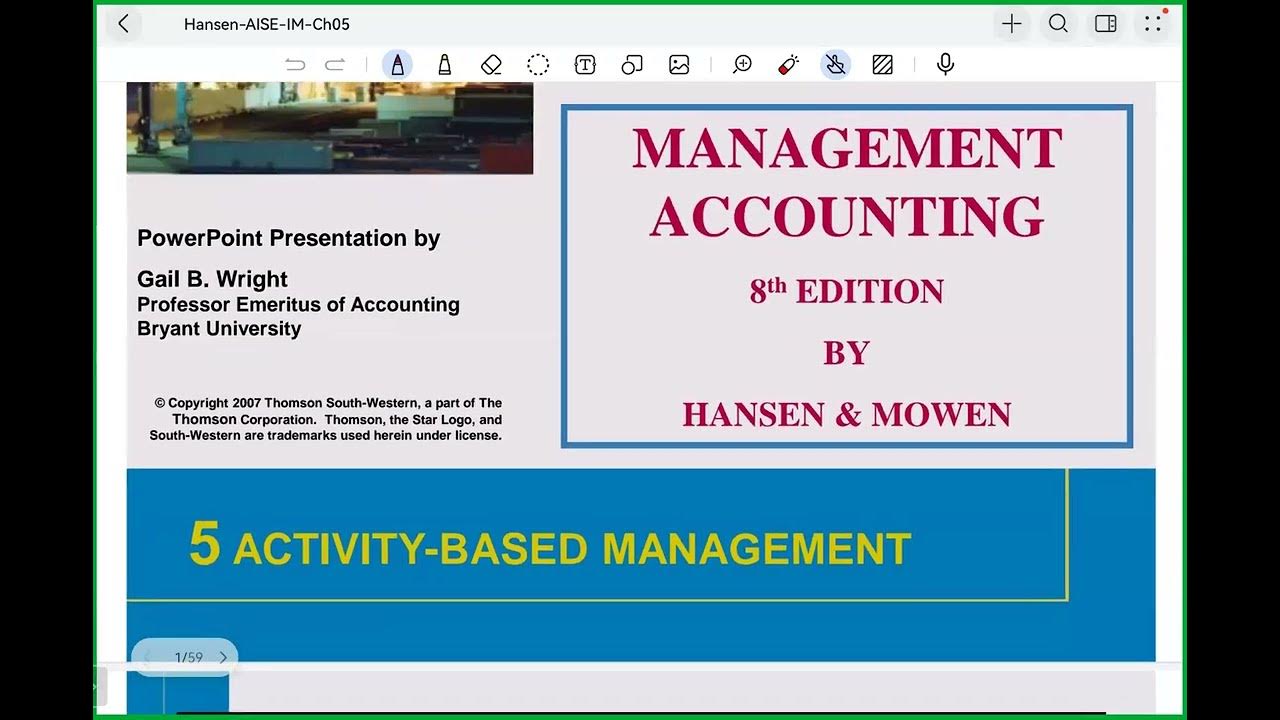MA15 - Activity Based Costing - Explained - Managerial Accounting
Summary
TLDRThis video explains the concept of Activity-Based Costing (ABC), a more accurate way to allocate overhead costs compared to traditional methods. While traditional costing uses a single rate based on direct labor hours, ABC uses multiple cost drivers to better reflect the various activities contributing to overhead, such as machine hours, setups, and supervisor involvement. ABC is particularly useful for companies with complex cost structures, providing more precise cost allocation and insights into profitability. However, it also comes with the challenge of more data tracking, making it more suited to companies needing detailed cost analysis.
Takeaways
- 😀 Costing a product is essential yet challenging, especially when calculating overhead costs like utilities and taxes.
- 😀 Material and labor costs are relatively easy to calculate since they are direct expenses (e.g., eggs, sugar, wages).
- 😀 Overhead is more difficult to allocate accurately because it's based on indirect costs that don't directly tie to a product.
- 😀 Traditional costing uses a single predetermined overhead rate based on one factor like direct labor hours, which simplifies calculation but may lack accuracy.
- 😀 In the traditional method, overhead costs are estimated and then applied using the predetermined overhead rate until actual costs are known.
- 😀 For example, if a company estimates $100,000 in overhead and projects 10,000 labor hours, the overhead rate would be $10 per labor hour.
- 😀 Activity-Based Costing (ABC) improves on traditional costing by using multiple overhead rates based on various activities that incur costs, such as machine hours or number of setups.
- 😀 ABC allocates overhead more accurately, considering factors like the number of setups, machine usage, or the number of orders instead of just labor hours.
- 😀 While ABC provides more accurate data, it comes with the trade-off of increased complexity and higher costs due to the need for tracking more activities.
- 😀 Many companies opt for the simpler traditional costing method unless they experience significant costing inaccuracies, as tracking multiple activities in ABC can be resource-intensive.
- 😀 Activity-Based Costing is beneficial for businesses seeking precision in their cost allocation, especially if they have varied production processes or overhead drivers.
Q & A
What is the primary focus of this module?
-The primary focus of this module is activity-based costing (ABC), which provides a more accurate method of assigning overhead costs to products compared to traditional costing methods.
How are material and labor costs typically handled in traditional costing methods?
-In traditional costing, material costs are calculated based on actual consumption of materials like eggs, sugar, or other ingredients, while labor costs are calculated based on actual wages and the hours worked by employees.
What challenge is typically associated with calculating overhead costs?
-The challenge with overhead costs is that they are often not directly tied to specific products, making it difficult to accurately assign them. Costs such as property taxes, utilities, and administrative expenses can vary and are harder to allocate per product.
What is the role of 'applied overhead' in traditional costing?
-Applied overhead refers to an estimated allocation of overhead costs to products based on predetermined rates, which are used until actual overhead costs are known.
What example does the instructor give to explain the traditional costing method?
-The instructor gives an example of a company making cupcakes, where the overhead is estimated to be $100,000, and the labor hours are estimated to be 10,000. The overhead rate is calculated as $10 per labor hour, which is then applied to the production process.
What is the limitation of using a single overhead rate in traditional costing?
-The limitation is that using a single overhead rate can lead to inaccuracies in cost allocation. Different products or activities might require different levels of overhead, and using one rate might not capture the true cost distribution, leading to over- or under-applied overhead.
How does activity-based costing (ABC) differ from traditional costing?
-ABC differs by using multiple overhead rates based on different activities (e.g., cleaning, machine hours, supervision) instead of relying on a single overhead rate. This allows for a more accurate allocation of overhead costs to products.
What are some activity drivers mentioned in the ABC method?
-Some of the activity drivers mentioned include the number of setups for cleaning, machine hours for utilities, the number of orders for supervision, and direct labor hours for general kitchen and administrative costs.
Why might companies opt for the traditional costing method over ABC?
-Companies might opt for the traditional costing method because it is simpler to implement and does not require tracking as many variables. It is often sufficient for businesses with straightforward production processes.
In what situations would it be advisable for a company to switch to activity-based costing?
-It would be advisable for a company to switch to ABC if they are experiencing discrepancies between their estimated and actual costs, or if they are dealing with a variety of products and need more precise cost allocation to make better pricing and production decisions.
Outlines

Cette section est réservée aux utilisateurs payants. Améliorez votre compte pour accéder à cette section.
Améliorer maintenantMindmap

Cette section est réservée aux utilisateurs payants. Améliorez votre compte pour accéder à cette section.
Améliorer maintenantKeywords

Cette section est réservée aux utilisateurs payants. Améliorez votre compte pour accéder à cette section.
Améliorer maintenantHighlights

Cette section est réservée aux utilisateurs payants. Améliorez votre compte pour accéder à cette section.
Améliorer maintenantTranscripts

Cette section est réservée aux utilisateurs payants. Améliorez votre compte pour accéder à cette section.
Améliorer maintenantVoir Plus de Vidéos Connexes

Activity Based Costing vs. Traditional Costing

Activity Based Costing Step by step

Teori Activity Based Costing ABC Akuntansi Manajemen

2023 Meet 5 Akuntansi Manajemen : Activity Based Costing

Activity Based Costing (ABC) Step-By-Step - Stage 1 Allocation - By Mike Werner (ABC Video 2 of 3)

Activity Based Management 1
5.0 / 5 (0 votes)
